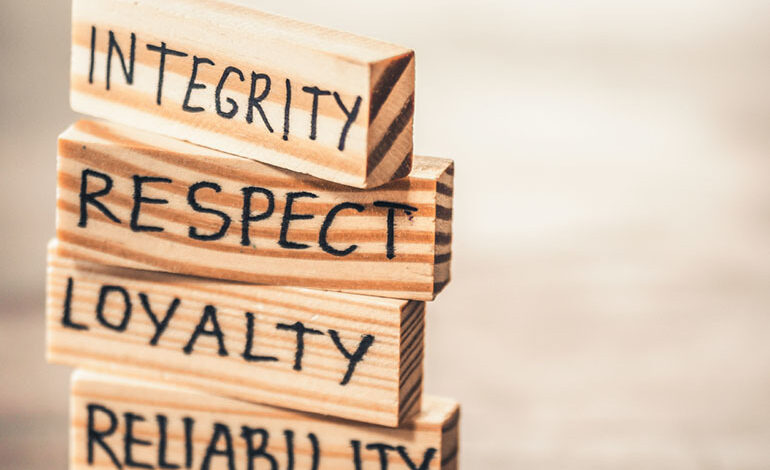It’s Time for an Ethics Refresh


By , CAE, CMP, CMM
As many of us begin the process of returning to face-to-face board, annual, and other meetings, comes the realization that that return may be quite different due to the loss of so many of our favorite supplier-partner members from the hospitality industry. While some are slowly returning as venues reopen, others have moved into other industries with better and more appealing employment opportunities. Not only will we have to adapt to new contracts, fees, charges, and the like, but also with the very people who have replaced those who left the industry over the many months of restricted living. It will be a time for many whether we assess our new partners and how well we are able to work with them and, hopefully, welcome them as new strategic partners for our organizations.
As we begin our journey into the new reality, and as staff begins to return to the office, it behooves us to spend quality time reviewing with staff all the relevant policies, procedures, and other guiding documents within our organizations as they relate to interactions with venues and meeting-related vendors. Likewise, each organization needs to incorporate a checklist of all new platforms, health and safety rules, onsite health and welfare checks, and the individuals – whether staff or contractors – are compliant with the organization’s rules for operation in a post-pandemic environment.
Over the past nearly two years much else has happened in our world – situations we never would have imagined could occur in our world. But they did. As we move forward, we also need to ensure that the positive outcomes for diversity, equity, and inclusion are incorporated into our organizations. No matter how large or small our organizations are, there is a place in each group to incorporate anti-hate, unconscious bias, gender equality, and other openly stated policies on equality for all. How these changes are integrated into our organizations depends on buy-in from the board, strategic partners, the members, and staff. Is ethics now a matter of DEI? Of course not. Established standards of ethical conduct within our organizations have not changed because of the pandemic, but remote work may have distanced our teams such that we need to review and ensure that those standards are being followed.
As we dust off existing governing documents, including any codes of conduct or ethics, do consider the explosion of multiple social media platforms and ensure that all of yours – new and old – conform to your ethical standards. Consider the approaches you will need to consider – member messaging, board-to-members messaging, increased use of LinkedIn for professional organizations, staff messaging. Establish policies on which platforms each is allowed to post on and in what capacity. Ask yourself:
- Do you allow unmoderated posts on your association’s official site?
- What is the exposure to your association if you do and the post is considered offensive or worse?
- Do you have your social media policies reviewed by legal counsel for the protection of the organization?
- Do those policies mandate training for all staff and volunteer leaders?
- Does your organization have a board of directors code of conduct, which requires annual training by all board members to ensure compliance with the code?
- Do you also have a process by which board members can be censured for inappropriate conduct – probably part of a larger policy dealing with board member conduct?
Finally, ensure that the individual monitoring social media platforms also has the authority to halt or remove a suspect post. If appropriate, that person can notify the poster that there is a question regarding the post, and someone will be in further touch to discuss why the post was flagged. Ensure that these discussions are always professional and respectful.
As face-to-face meetings return for most organizations, please ensure that both your staff members and your strategic partners are aware of your organization’s stance on the giving of gifts – what is allowable and what is not. Reach out to your strategic partners and compare your policies with those of their brand to ensure there is no conflict among them. Your local representative may be unaware of the overarching policies of their brand, but search online for any of the major brands using the term “Code of Ethical and Business Conduct” or “Supplier Code of Conduct” and you will find publicly posted Codes such as:
- Hyatt Policies, Statements & Reporting
- Hyatt Supplier Code of Conduct
- Hilton Hotels Corporation, Code of Business Conduct & Ethics
- Marriott Business Conduct Guide
The ASAE Code of Conduct, although aspirational, and accompanying Toolkit provides excellent guidance for association executives, consultants, and industry partners on how business should be conducted among them. Its core standards speak to each of the three classifications and how they should conduct themselves in specific situations. ASAE’s Toolkit is available only to ASAE members and resides behind their firewall.
ASAE’s Advice for Creating a Code of Conduct in Your Association is a good place to start if you do not have an existing code of conduct for your association.
A good Code of Conduct will also feature a strong Conflict of Interest section. ASAE’s Code of Conduct requires one to:
- Be honest in conducting business, including transparently and disclosure of all potential and actual conflicts of interest.
- Act fairly, serving the interests of the member organization.
And it typically requires an annual declaration by volunteer leaders. See, also, Essential Elements of an Association Conflict-of-Interest Policy.
A discussion of Code of Conduct issues is seldom had without raising the topic of embezzlement and how to avoid it in associations. A good and simple definition of embezzlement is “the act of appropriating funds that you have access to, are left in your care, but are rightfully owned by another party.”
If you agree with any of the following statements, then your association is asking for trouble.
- If your books balance, that means no crime has been committed
- Honest staff members equal low embezzlement risk
- The CPA will discover any embezzlement during an audit
- Embezzlement is not a big deal
A good and recently updated guide can be found in Fraud, Theft & Embezzlement in Nonprofit Organizations, Part 1: Top Preventive Measures Your Organization Can Take, Venable LLP, September 2, 2021. A second Venable article, Fraud, Theft & Embezzlement in Nonprofit Organizations, Part 2: Investigating & Responding to Allegations of Fraud and Embezzlement, October 2021 complements Part 1 and contains excellent advice. An earlier article (2014), Embezzlement: It Could Happen to You, is a frank and eye-opening account of how fraud and embezzlement can happen anywhere.
There is no one who can argue that ethics is an important topic. Not only does it improve relationships, promote professional behavior, encourage accountability, and protect the public, but it also enhances the organization’s image and reputation.




